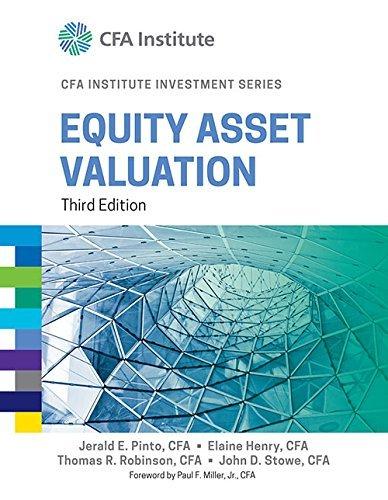When analysts at brokerage firms recommend a stock to the public that later performs very poorly, or
Question:
When analysts at brokerage firms recommend a stock to the public that later performs very poorly, or when they fail to uncover negative corporate activities, they can sometimes come under public scrutiny. Industry leaders may then be asked to respond to such criticism and to comment on expectations about the role and responsibilities of analysts. One such instance occurred in the United States as a consequence of the late 2001 collapse of Enron Corporation, an energy, utility, trading, and telecommunication company. In testimony before the US Senate (excerpted below), the President and CEO of AIMR (predecessor organization of CFA Institute) offered a summary of the working conditions and responsibilities of brokerage analysts. In the following passage, due diligence refers to investigation and analysis in support of a recommendation; the failure to exercise due diligence may sometimes result in liability according to various securities laws. “Wall Street analysts” refers to analysts working in the US brokerage industry (sell-side analysts).
What are Wall Street analysts expected to do? These analysts are assigned companies and industries to follow, are expected to research fully these companies and the industries in which they operate, and to forecast their future prospects. Based on this analysis, and using appropriate valuation models, they must then determine an appropriate fair price for the company’s securities. After comparing this fair price to the current market price, the analyst is able to make a recommendation.
If the analyst’s “fair price” is significantly above the current market price, it would be expected that the stock be rated a “buy” or “market outperform.”
How do Wall Street analysts get their information? Through hard work and due diligence. They must study and try to comprehend the information in numerous public disclosure documents, such as the annual report to shareholders and regulatory filings . . . and gather the necessary quantitative and qualitative inputs to their valuation models.
This due diligence isn’t simply reading and analyzing annual reports. It also involves talking to company management, other company employees, competitors, and others, to get answers to questions that arise from their review of public documents.
Talking to management must go beyond participation in regular conference calls. Not all questions can be voiced in those calls because of time constraints, for example, and because analysts, like journalists, rightly might not wish to “show their cards,” and reveal the insights they have gotten through their hard work, by asking a particularly probing question in the presence of their competitors.
Wall Street analysts are also expected to understand the dynamics of the industry and general economic conditions before finalizing a research report and making a recommendation. Therefore, in order for their firm to justify their continued employment, Wall Street analysts must issue research reports on their assigned companies and must make recommendations based on their reports to clients who purchase their firm’s research.17
Step by Step Answer:






